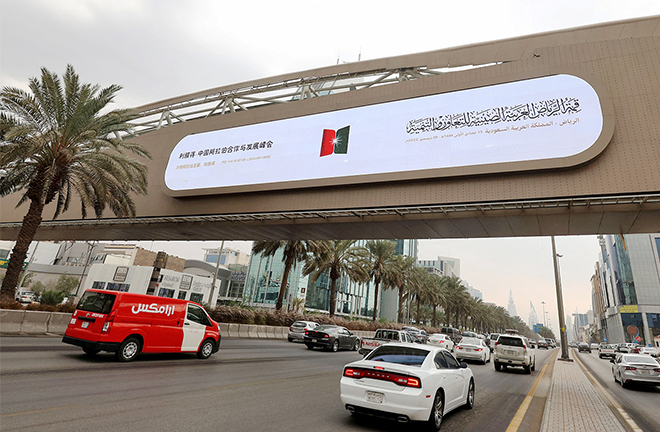Civilizational exchanges advance China-Arab ties

Photo taken on December 7, 2022, in Riyadh, shows a billboard publicizing the first China-Arab States Summit in Chinese and Arabic. Photo: CFP
The first China-Arab States Summit took place on Dec. 9 at King Abdul Aziz International Conference Center in Riyadh, capital of Saudi Arabia. Chinese President Xi Jinping attended the summit alongside the China-Gulf Cooperation Council Summit, and paid a state visit to Saudi Arabia. In his keynote speech to the summit, Xi called for efforts to increase exchanges among civilizations to enhance mutual understanding and trust.
In an attempt to examine China-Arab exchanges in the new era, CSST recently interviewed Wang Youyong, a professor of Arabic language and literature at Shanghai International Studies University, and Hassanein Fahmy Hussein, an Egyptian Sinologist and professor of Chinese language at Ain Shams University in Egypt. Both have long been devoted to promoting bilateral exchanges by translating classical, modern, and contemporary literary works from China and the Arab world.
Comprehensive bilateral ties
The China-Arab relationship has a long history. Friendly bilateral cooperation has reached historic breadth and depth, setting an example for South-South Cooperation. However, when discussing the relationship between China and Arab states, many media outlets and institutions tend to limit bilateral ties to oil and gas. In fact, the China-Arab partnership has generated a wide range of fruitful results, from deployment of 5G technology and navigation satellites to artificial intelligence, new materials, astronaut training, and aerospace exploration, and further to developing smart cities and public health. According to the Report on China-Arab Cooperation in the New Era released ahead of the summit, agriculture, investment and financing, and high-tech industries will become key areas of China-Arab cooperation.
Civilizational exchanges play a significant role in China-Arab cooperation. Wang told CSST that China and Arab states should adhere to their own stances in bilateral exchanges. “We should seek common ground and reserve differences, instead of being affected by Western public opinion,” Wang said. “We need to and are able to play the leading role in exchanges and cooperation between China and the Arab world.”
Wang further stated that the overland and maritime Silk Roads have laid a solid foundation for friendly China-Arab exchanges. Moreover, the two sides have almost no history of military conflict. China is a civilized state with a long history, which positively influences the Arab people.
The two sides should understand each other’s culture, build strategic partnerships, advance the Belt and Road Initiative, and enhance understanding about each other’s history and culture, thereby building groundwork for the deeper development of the partnership on all fronts, Wang said.
High-level mutual visits matter
From the perspective of high-level visits between China and Arab states, Hussein shed light on the way these visits generated positive effects on bilateral cultural exchanges. In 2016, President Xi paid formal visits to Saudi Arabia, Egypt, and Iran. At that time, Hussein deeply felt that the Saudis held a positive attitude toward China’s opening up, particularly toward the top Chinese leader visiting Saudi Arabia and having face-to-face dialogue with the Saudi king and other leaders of the country, and toward bilateral cooperation in multiple fields.
In 2019, Saudi Crown Prince Mohammed bin Salman visited China. Following his return, he ordered the incorporation of the Chinese language into the national education system, resulting in a growing number of schools and social organizations teaching Chinese.
President Xi’s meeting with leaders of many Arab states during this state visit to Saudi Arabia has cultivated interest in Chinese culture among young Saudis and sparked their eagerness to visit China and learn the Chinese language, Hussein said.
Hussein noted that high-level mutual visits have again evidenced the long-established friendship between China and the Arab world. In recent years, the two sides have made remarkable achievements in economic and political cooperation, but deeper down are exchanges on the civilizational and cultural levels.
For example, the annual World Youth Forum convened in Egypt invites Chinese representatives to attend each year. In Egypt, activities are often held which pertain to Chinese culture, such as the “Happy Spring Festival” and the “Chinese Bridge Competition.” “More and more Egyptian young people have joined the force of learning Chinese language and culture,” said Hussein.
From documents released by high-level authorities, we can tell that both China and Arab countries attach special importance to cultural exchanges, Hussein said.
Currently, several cultural projects have unfolded and prompted translation of more Chinese books into Arabic. Meanwhile, Arab countries support efforts to translate more literary works from Egypt and other Arab states into Chinese. Hussein said that these projects have further enriched bilateral exchanges, especially between young people on both sides, providing a broader platform for understanding each other’s culture.
Edited by CHEN MIRONG

 PRINT
PRINT CLOSE
CLOSE